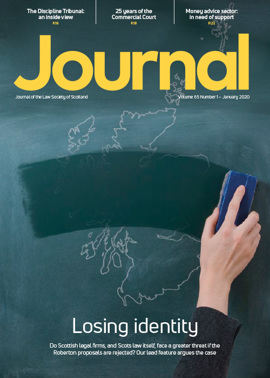Budget manoeuvres

December’s general election resulted in the largest Conservative majority in the House of Commons since the 1980s. The party’s manifesto promised a Budget within 100 days of the general election, and it was widely thought that the Chancellor would deliver his Budget in late February, but it was announced on 7 January that the Budget would be delayed until 11 March, a move which the Scottish Finance Secretary described as “disrespectful to devolution”.
Devolution disruption
Derek Mackay warned that the delayed Budget could have “profound consequences” for Scotland. Scottish councils must set their budgets by 11 March, and the Convention of Scottish Local Authorities (COSLA) has written to the Chancellor warning of the deep risk facing Scotland’s councils as a result of delaying the UK Budget, describing the decision as “extremely worrying”.
In recent years, a November Budget at Westminster would be followed by Holyrood’s in December. Then there would be two to three months of parliamentary scrutiny before it became law for the start of the new tax year in April. Mackay was originally set to deliver his Scottish Budget on 12 December, but that was delayed due to the snap general election held on that date. Alexander Grant, chair of the Chartered Institute of Taxation’s Scottish Technical Committee, warned that the delay in the UK Budget will leave MSPs in a race against time to set next year’s Scottish Budget, diluting opportunities for scrutiny and leaving HMRC scrambling to ensure its systems are ready for April.
A UK Budget on 11 March leaves MSPs with just a few days to react to any tax changes made at Westminster and to agree the rates and bands of Scottish income tax ahead of the start of the new tax year in April. Mackay warns that: “The single biggest danger – however unlikely – is if the Parliament doesn’t pass a rate resolution in time then there is no authority to collect income tax, so that’s a £13 billion risk.”
It is of course possible for Holyrood to choose to go first and set a Budget before Westminster, but this is unlikely as the size of the Scottish block grant will not be known until the Westminster Budget, therefore the Scottish Finance Secretary would be left without Scotland’s full fiscal picture.
Manifesto promises
The main personal finance pledge in the Conservative manifesto was a tax cut in the form of an increase in the threshold for paying national insurance to £9,500 for 2020-21, aiming to reach £12,500. The rate of corporation tax will remain at 19% and R&D tax credits will be increased to 13%. The Government plans to implement significant changes to capital gains tax, focusing on lettings relief (such that it only applies where the owner is in shared occupation with their tenant), and principal private residence relief, where homeowners need to ensure they stay in their home before it is sold, or ensure that a sale of old property takes place within nine months (previously 18 months) of them moving out, to avoid a capital gains tax charge.
The Conservative Government has promised a review of entrepreneurs’ relief, a relief which reduces the rate of capital gains tax from 20% to 10% on disposals of certain business assets, and it remains to be seen what changes will be implemented in the 11 March Budget, with a fuller review expected to take place in 2020-21. A number of tax avoidance and tax evasion measures are also expected to be announced.
The post-Brexit scene
Central to the Conservatives’ election campaign was the promise to “get Brexit done”. Prime Minister Boris Johnson has promised that the UK will officially leave the EU on 31 January 2020. A post-Brexit trade deal is, at the time of print, still being negotiated and the precise tax implications of Brexit are not yet known. EU tax laws are likely to remain in place during the transitional period, which will be in place until 31 December 2020. Although it is possible that the period may be extended, the Prime Minister promised not to extend the transition period beyond 31 December 2020.
The biggest tax impacts of Brexit are likely to be, from a tax litigation perspective, the impact on the interpretation of UK tax law in accordance with EU law and the fundamental freedoms and, from a practical perspective, the fact that UK VAT law is based on EU directives and regulations. More detail will become available once the specific terms of the trade deal are negotiated, but it is likely that the years to come will be interesting from both a tax legal advisory and litigation perspective.







